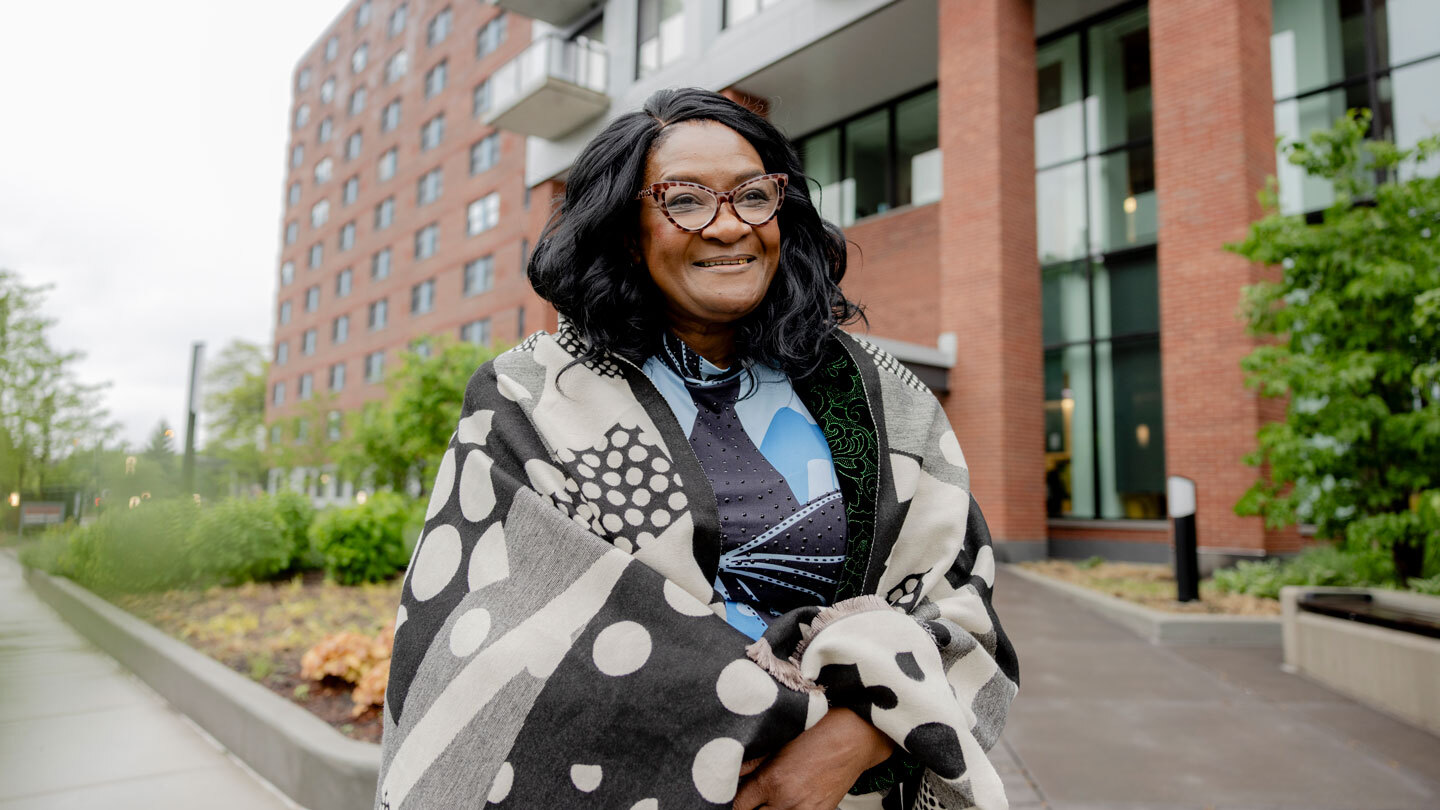Pastor Evelyn Glover has found something invaluable at Edith Spurlock Sampson Apartments: peace of mind. "Affordable housing for me alleviates the stress of having to figure out how I'm going to pay my rent, how I'm going to meet my bills," she reflects. "It relieves us from the stress of the outside world." For Pastor Glover and her neighbors, having a stable, affordable home has become the foundation for everything else—including their dreams for the future.
Meeting Chicago's housing opportunity
Chicago's economy is thriving, with new businesses and growing neighborhoods creating exciting possibilities for residents across the city. As opportunities expand, so does the need for housing that allows people to continue to live and work in the communities they've helped build over generations.
The numbers tell an important story: Chicago has the potential to create over 100,000 new affordable housing opportunities, connecting residents with homes that fit their budgets and their lives. "We invest in community development and affordable housing because we want to be part of a healthy community where our clients, our communities, our partners, and our employees can thrive," says Kevin Goldsmith, Managing Director for Community Development Tax Credits and Intermediaries Lending at JPMorganChase.
As one of Chicago’s largest employers, JPMorganChase recognizes that our business is only as strong as the communities we serve. Since 2019, we have committed more than $200 million in philanthropic capital to support the South and West Sides, focusing on making housing more accessible, strengthening neighborhoods, and expanding opportunities for economic growth.
Knocking down barriers to homeownership: Connecting Capital and Community
One of our initiatives, with Connecting Capital and Community, opens new pathways to homeownership in the West Side neighborhoods of East Garfield Park and Humboldt Park. "It's important to help folks become homeowners," says Lynnette McRae, program director at the Chicago Community Trust, a local foundation that funds Connecting Capital and Community, along with the JPMorganChase Foundation. "But it was also our goal to think about what needs to change in the homeownership system—not only for homeowners, but also for developers trying to create more affordable-housing supply."
One way Connecting Capital and Community is implementing that change is through a collaboration with Inherent Homes, an innovative residential home-building company that aims to provide better housing for more Chicagoans—particularly in places like the city’s West Side. Connecting Capital and Community’s mortgage program, in partnership with Neighborhood Housing Services of Chicago, offers a 3.5% interest rate over a 30-year term, compared to typical market rates of 6% or higher. The impact can be transformative, McRae notes: "If I've got a six and a half percent interest rate, I may qualify only for a $250,000 loan. But with a three and a half percent interest rate, I may be able to afford a $350,000 home."
The relationship connects valuable resources across our extensive network, creating the kind of multifaceted collaboration that can spark systemic change throughout Chicago's housing landscape.
Building affordable housing: Edith Spurlock Sampson Apartments
The Edith Spurlock Sampson Apartments show another pathway for public-private collaborations to support sustainable, affordable housing. With $32 million in construction financing and $94 million in housing tax credits from JPMorganChase, this project transformed an existing development into 405 affordable rental homes for seniors.
The financial structure required creative problem-solving, says Lee Pratter, Deputy Chief Development Officer at the Chicago Housing Authority. "JPMorganChase was able to say, 'We understand the complexities," she explains. "It was critical to have a partner work with us to deliver on promises to our residents, the public and our funders. This was 405 units—a huge development in Chicago. We wouldn't have been able to do it without the financial resources and support JPMorganChase brought."
We provided guidance throughout design reviews, closings, and construction phases. The initiative has established a model for future projects, with lessons being applied to developments across Chicago.
"It's actually a form of salvation for me,” says Pastor Glover of her experience with the program. “Edith Spurlock Sampson Apartments has come to my rescue, as it has for many of my fellow residents. It is the sanctuary that we have."
Strengthening Chicago's communities
Since the time of Jane Jacobs, urban planners have understood that affordable housing strengthens a city's economy, culture, and character. This understanding guides our commitment to supporting opportunities that help residents thrive in the communities they've built.
For McRae, the work of building an ecosystem to support affordable housing is about the people of Chicago first and foremost. "As our city is growing, it's also really important to make sure that the families who have lived in these communities for many years have opportunities to become homeowners and to build wealth and to invest in their communities,” she says. “As we think about the growth of our city, it's really important to center the people as part of that, and to make sure that they have that same opportunity to participate in that growth."
The testimonials are the sole opinions or experiences of those featured and not those of JPMorgan Chase Bank, N.A. or any of its affiliates. These opinions or experiences may not be representative of what all may achieve. JPMorgan Chase Bank, N.A. or any of its affiliates are not liable for decisions made or actions taken in reliance on any of the testimonial information provided.




